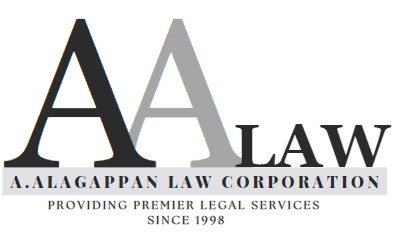
Advocates & Solicitors ι Notary Public ι Commissioner for Oaths
Our Services >
Practice Areas >
Employment
Employment
Employment disputes under the Employment Act
Employment Act
1. The Employment Act (the ‘Act’) tells you about your rights and obligations as an employee.
2. You are an employee under the Act, if you are:-
(a) employed under a contract of service;
(b) any officer or employee of the Government included by the President as an employee;
(c) a ‘workman’, ie
(i) if you engage a skilled or unskilled manual labour, including an artisan or
apprentice;
(ii) if you operate or maintain transport vehicles for hire or commercial use;
(iii) if you engage in partly manual labour and partly in the supervision of a workman;
(iv) a bus conductor;
(v) a lorry attendant;
(vi) a bus, lorry and van driver;
(vii) a bus inspector;
(viii) a goldsmith and silversmith employed in the premises of an employer;
(ix) a tailor and dressmaker employed in the premises of an employer;
(x) a harbour-craft crew
(xi) a workman employed on piece rates in the premises of the employer
(d) not a domestic servant, seaman, manager, executive or secretary.
3. If you are an employee earning more than $1,600.00 per month (excluding overtime, bonus, Annual Wage Supplement and other allowances), the following provisions in the Act will not apply to you:
(a) priority of salary claims over other debts;
(b) Commissioner's power to inquire into amount due to employee; and
(c) rest days, hours of work, holidays and other conditions of service.
Please note that for this part, subcontractors for labour are considered employees.
4. In such situations, you must refer to your contract of service. Since the provisions in the Employment Act set the minimum standard, the terms of your contract of service must be at least equal to or more favourable than the provisions in the Act, otherwise the terms that are less favourable will be illegal and invalid.
Salary
5. Your salary must be paid at least once a month (not necessarily on the first day of a calendar month) and within the first 7 days of each salary month. For example, if you are to be paid on the 15th day of each calendar month, you must be paid no later than the 22nd day of the month.
6. You cannot be forced to sign a contract of service. When you have completed your contract
of service, you must be paid all your salary and your employer must allow you to leave your job.
7. If your employer ends your contract of service, you should be paid within 3 days of the end of your employment. If you end your employment, you should be paid within 7 days of the end of your employment. If you give due notice, your salary must be paid to you on the day that your employment ends.
8. Your employer can make deductions from your salary for a number of reasons such as:-
(a) absence from work without good reason;
(b) repayment of a loan;
(c) income tax;
(d) CPF contributions;
(e) the costs of goods entrusted to you which are lost or damaged because of
your negligence or loss of money that you, as an employee, are responsible for; and
(f) if you agree, for housing accommodation and meals.
The deductions cannot amount to more than half your monthly salary but more than half may be deducted from your last salary before the end of your employment.
9. Your employer may provide you with extra allowances in addition to your salary such as food
and/or accommodation. If your employer provides you with housing accommodation, there
must be a proper supply of water, proper sanitary arrangements and first aid
equipment available.
10. All salary must be paid in legal tender and be paid into your personal or joint account or
by cheque to you.
11. If your employer does not comply with the above, he is guilty of an offence and can be fined
up to $1,000 or jailed for 6 months.
Working conditions
12. There are 7 issues which will be applicable only to you if your monthly income is less than $1,600 per month, or if you are a workman:-
(a) working hours;
(b) overtime;
(c) rest time;
(d) salary entitlement when working on a rest day;
(e) Shift workers;
(f) holidays and annual leave;
(g) sick leave; and
(h) retrenchment and retirement benefits.
Working Hours
13. Generally, you are not required to work more than 8 hours a day (or 44 hours a week).
14. The exceptions to this general rule is as follows. You can:-
(a) agree to work less than 8 hours a day on one or more days, or work 5 (or less) days
a week.
(b) Work for 48 hours a week (or 88 hours over 2 weeks), if you agree to work less than 44 hours every alternative week.
(c) Work unlimited hours and on rest days, if there is an accident, or if the work is essential to the life of the community, defence or security, or if there is urgent work to be done to machinery or plant or an unforeseen interruption of work.
(d) You are required to work for a maximum of 12 hours in a day. However, you may
be asked to work longer under the circumstances mentioned in (c) above.
If you work more than the hours above, you are working overtime.
15. You cannot do overtime work for more than 72 hours a month. If you work overtime, you
should be paid 1.5 times your ‘hourly-rate of pay’.
Rest time
16. You are entitled to have at least 1 rest day a week which need not be a Sunday.
17. You are allowed to have a rest period after working continuously for 6 hours. However,
if the nature of your work is such that it must be done continuously, then you must have a 45-minute off meal break within 8 hours.
18. Any continuous period of 30 hours is considered a rest day.
Salary entitlement when working on a rest day
19. You cannot be forced to work on a rest day unless the type of work you do is such
that it needs to be carried on continuously in shifts.
Shift worker
20. As a shift worker, your hours or work may differ from those of other workers. As a shift
worker, you can:-
(a) be required to work more than 6 consecutive hours without a break, or more
than 8 hours (but not more than 12 hours) a day, or more than 44 hours a week (but
not more than an average of 44 hours per week over a period of 3 weeks.
(b) claim overtime, if you work more than an average of 44 hours per week
over a period of 3 weeks.
21. You must consent in writing to working on shift. For your consent to be valid the
following requirements must be met:-
(a) Section 38 and 40 of the Act must be explained to you;
(b) you must be informed of the following:-
(i) when your working hours start and end;
(ii) the number of working days per week; and
(iii) your rest day.
Holidays and annual leave
22. You are entitled to have an off-day on all official public holidays (but you may agree with
your employer to change the off-day to another day). If the public holiday falls on the
rest-day, you are entitled to have the following day off.
21. Your annual leave entitlement depends on how long you have worked for your employer.
(a) You are entitled to 7 days annual leave if you have worked for 12 continuous months with the same employer;
(b) Thereafter, you will get 1 extra day for every addition year of work up to a maximum of 14 days;
(c) After working for 3 months, you are entitled to pro-rate your annual
leave. In calculating the pro-rated leave, any fraction which is less than half a day
shall not be counted, and if it is more than half, it shall be counted as 1 day.
22. Your employer can forfeit your annual leave if you absent yourself from work for more
than 20% of the number of working days in the month or year.
Sick leave
23. After 6 months of work, you are entitled to 14 days of non-hospitalisation sick leave
and 60 days of hospitalisation leave. If you are hospitalised for less than 46 days in any
1 year, your entitlement to paid sick leave shall not be more than a total of 14 days and the number of days you are hospitalised.
24. All sick leave must be certified by a medical officer or a doctor and you must inform
your employer within 48 hours that you are on sick leave or you will be deemed to be
absent from work.
Retrenchment benefits
25. Your employer can retrench you if you are no longer needed or if there is a reorganisation
of your employer's business. Your employer need not give any reasons and he cannot be
stopped from employing new workers after a retrenchment exercise.
26. If your employment agreement promises to pay some money on retirements but not
upon ending of your employment by reason of the employer ceasing to carry on business from
whatever reason, or, by reason of the employer transferring the whole or part of
his undertaking or property as the case may be (‘event’), the law will entitle you to the same amount of money upon that event happening. (Section 47(2))
27. Retrenchment benefits are payable only if your contract of service (or a collective
agreement if you a union member) says so or if your employer decides to pay you ex-gratia
(gratuitous) retrenchment benefits.
28. If you have worked for less than 3 years with your employer, you are not entitled
to any retrenchment benefits. However, this does not mean that your employer must pay you
retrenchment benefits if you have worked for more than 3 years.
29. You are not entitled to any retirement benefits if you have worked for less than 5
years for your employer. However, this does not mean that you are automatically entitled to
retirement benefits if you worked for your employer for at least 5 years.
30. The amount of retirement benefits is not stated in the Act and must be negotiated
between yourself (or your trade union) and your employer. CPF savings are now
generally considered to be retirement benefits.
Termination of contract of service
31. The period of notice for either you or your employer to terminate your contract of
service should be stated in your contract.
32. Notice can be given at any time, but it must be dated and given in writing.
33. Either you or your employer can choose to waive your right to notice. Either party
can also choose not to wait for the notice period to expire. In this case, the party who does not
wish to wait for the expiry of the notice period must pay the other salary in lieu of notice.
34. If there has been a breach of the terms and conditions of the contract of service,
eg your employer fails to pay your salary on time, notice of termination need not be given.
35. Instead of dismissing you, your employer can do the following:- The employer can,
instead of dismissing you, do the following:-
(a) instantly downgrade you; or
(b) instantly suspend you without pay for a period not exceeding 1 week.
36. If you think that your employer has acted wrongfully, you can complain to the
Ministry of Manpower within 1 month of the dismissal.
Maternity leave
37. Female employees are entitled to maternity leave 4 weeks before and 4 weeks after
delivery of their child.
38. To be entitled to full pay during maternity leave, you must have worked for at least
180 days before delivery of the child. You are only entitled to full pay during maternity leave
for your first two children.
39. If you worked on any day during your benefit period before confinement, you are
entitled to receive your gross rate of pay for that day, plus an amount equal to a day’s pay at the gross rate, or, alternatively, you are entitled to a day’s leave after your benefit period ends.
40. You must inform your employer at least 1 week before you commence your maternity
leave and also inform your employer of the date of delivery of your child as soon as possible.
If you do not give the notice, you will only be entitled to half pay unless you have good
reason for not giving the notice.
41. Maternity leave is your entitlement and it is illegal for your employer to ask you to
give up your maternity leave.
42. You are entitled to be paid your full salary as usual during your maternity leave, but
you are not allowed to claim for sick leave. Your employer is not entitled to terminate your
service and you are not allowed to used your maternity leave as notice period for
termination of your employment.
43. If your employer gives you notice of dismissal for no good reason within a period of
3 months before your confinement, you are still entitled to your usual payment. If you feel
that you have been dismissed without good reason, you should refer the matter to the
Minister of Manpower within 2 months of your confinement date.
44. However, if you work in another job when you are supposed to be on maternity
leave, you can be dismissed.
Adapted from Law Society
As at 21 April 2016

